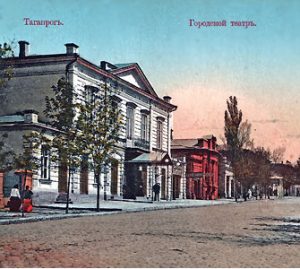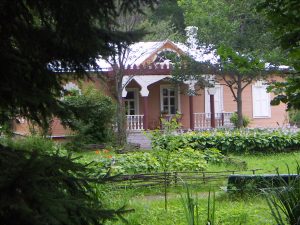Despite his age, Anton Chekhov was always aware of the social status or standing of his family; while his father was a merchant, his paternal grandfather and his family were all serfs, peasant farmers who had to work on their lord’s estate, of the landowner Chertkov and desperately sought freedom (Chekhov, 8-9). His grandfather, Mikhail Emelianovish, bought himself out of serfdom before its abolition and freed his remaining family in 1841. During his childhood however, Chekhov and his family first occupied the first floor of a big two-story house that they shared with two other tenants who lived upstairs (Chekhov, 17-19). Across their house in Taganrog, the family could see Mitrofanievsky Squares, the homeplace of the marketplace as well as public executions. On execution days, many citizens would gather in the square to witness a criminal be tied to a post and be killed, although the Chekhov family would watch the execution from their upper floor windows (Chekhov, 17-19).
Once the family moved into their own small and cramped house in 1874, a low-quality house that left their father with debt, the family became influenced by Greek society (Chekhov, 20). The rich Greeks were at the top of Taganrog’s society, flaunting their money and wealth wildly, Pavel Chekhov, the patriarch of the family, believed that his children should follow in the steps of the Greeks (Chekhov, 21-22). The three eldest sons only briefly attended a prestigious Greek school however, their father still remained faithful in the Greek custom. However, Anton would often abandon the Greek way such as when he and his brothers would attend the theater with their mother; their mother would sit in the orchestra while Chekhov and his brothers would sit in the gallery. At the end of each act, social custom was to call out the names of the actors performing, but instead, Anton would shout the names of Greek aristocrats to the point where other members of the audience would cry out alongside them, causing the Greek nobles to feel so uncomfortable that they would leave the show early (Chekhov, 23). The Taganrog public was known to be wild and rowdy, deeply invested in their theater; bad performers would be whistled off stage, schoolboys would adorn special ties to show their support for certain sopranos, and even theater technicians would reveal information about performances to students (Rayfield, 28). In addition, alongside these symphonic concerts of the theatre, Taganrog’s park had an orchestra with free entry to the public. Nonetheless, the Chekhov still originated from a family of serfs, meaning that they were of a low-class and struggled financially. Eventually, the family lost their house and they father had to run away to avoid debtor’s prison, with only part of the Chekhov family following behind; Anton had to stay behind in Taganrog with his brother Vania while the rest of his family lived in Moscow (Rayfield, 50).
Anton Chekhov finally joined his family in Moscow on August 8, 1879 and for the following twenty years, the city and its surrounding would be his home. At the time period, Moscow was a less Europeanized (when compared to then Russia’s capital, St. Petersburg), folksy, and cosy village that housed eight hundred thousand inhabitants and known for its taverns and churches. During the late 1870s, the social environment was filled with political assassinations and trials as battles between revolutionaries and the police seemed to dominate conversations among Russians, yet, these events did not largely affect the population. Soon after, came the assassination of the ruling figure, Alexander II, in St. Petersburg in 1881, resulting in the rigorous regime of Alexander III. The severity of the new reign was reflected in an incident following a railway accident between Chekhov et police officer; near Kukuevka, a crowded train leaving Moscow had a terrible crash and buried its victims alive, a catastrophe to which Chekhov found that could only occur in a “swine-ish” country (Chekhov, 88). Although Chekhov was not imprisoned for expressing an unpatriotic sentiment, late Imperial Russia did not tolerate full freedom of behavior. Regardless of their new location, the Chekhov family was still struggling financially and they busied themselves with survival, each of them finding work in order help keep their family afloat; Anton Chekhov chose to pursue medicine in order to provide for his family and his practice allowed him to meet people of all social standings. After multiple excursions around Europe, in 1891, Chekhov returns to Moscow to a famine that desolated southern and eastern Russia during the winter of that year and 1892. Seeking to helping the struggling peasants, Chekhov attempted to dissuade them from killing their horses and instead buying them, keeping them fed through the winter in order to return them in the spring. However governmental policies and ineffective authorities prevented Chekhov from accomplishing his goal. Throughout the famine, the food-producers were suffering from the famine whereas officials and other professionals were less likely to go hungry (Hingley, 155). After his health became much worse during the winter and witnesses such hardship, Chekhov decided to leave Moscow for a home in the countryside not only to practice medicine among peasants and improve his health, but also to reduce his expenses.
Chekhov moved to Melikhovo on March 4 1892, a time period where Emperor Alexander III would die and give the power to his son Nicholas II, marking the transition from a direct and no nonsense conservative to a less effectual one (Hingley, 158). Although many hoped for a great change in traditional control of the Russian government, the transition of power nevertheless brought a feeling of relaxation amongst the people as Russians would take their autocratic government less seriously (Hingley, 158). Although Melikhovo allowed Chekhov to enjoy the farm lifestyle, he lived and worked among the peasants, a group of people who made the largest social group of citizens in Imperial Russia. Along with the greatness in volume of them, another striking quality of peasants was their primitiveness (Hingley, 159). Between ages nine and forty-nine, only twenty-two percent were noted able to read and write (Hingley, 168). In addition, their health was even more depressing as well as their poverty and poor nourishment. Chekhov worked tirelessly as a doctor in order to help combat the wide array of problems facing the entire class of people. After experiencing such hardship as a child, Chekhov’s time in Melikhovo served as his method to both chronicle the difficulties of a social class and benefit the lives of many peasants.



